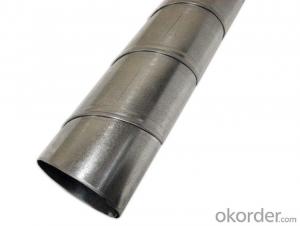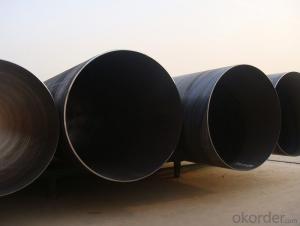SPIRAL STEEL PIPE 24’‘26‘’ 28‘’ 32‘’LARGE DIAMETER PIPE
- Loading Port:
- Tianjin
- Payment Terms:
- TT OR LC
- Min Order Qty:
- 5 m.t.
- Supply Capability:
- 3000 m.t./month
OKorder Service Pledge
OKorder Financial Service
You Might Also Like
Packaging & Delivery
Packaging Detail: | standard export packing or as customer's requirement |
Delivery Detail: | within 10 - 30 days |
Specifications
Spiral Welded Steel Pipes and Tubes
1.Material:Q195-Q235
2.Length:1-12m
3.WT:1.0-14mm
4.O.D.:20-273mm
Spiral Welded Steel Pipes and Tubes
Product Description:
1.Material : Q235,Q345,L245,L290,L360,L415,L450,L485,GrB,X42,46,X52,X56,X60,X65,X70,X80,X100
2,Standard: SY/T5037-2000,GB/T9711-2011,API Spec 5L PSL1/PSL2,ASTM A252\A53,ISO3183,DIN17172,EN10217,JIS G3457,AWWA C200,ASTM A139,ASTM A671,ASTM A672
3.Wall thickness: 3.0mm-30mm
4.Outer diameter: φ168mm-3020mm
5,Length: 5m-12m or as your requirement
6,Corrosion protection standard: DIN30670,DIN30671, AWWAC210, AWWA C203, SY/T0413-2002,SY/T0414-2002
7,Application: Oil, gas, natural gas, water pipe, thermal electricity pipe, steel structure engineering, etc
Q195-q345 Material Steel Pipe's Materials
Elements | Chemical Compsition% | Mechanical Property | ||||||
C% | Mn% | S% | P% | Si% | Yield Point (Mpa) | Tensile Strength(Mpa) | Elongation | |
Q195 | 0.06-0.12 | 0.25-0.50 | <0.050< span=""> | <0.045< span=""> | <0.030< span=""> | >195 | 315-430 | 32-33 |
Q215 | 0.09-0.15 | 0.25-0.55 | <0.05< span=""> | <0.045< span=""> | <0.030< span=""> | >215 | 335-450 | 26-31 |
Q235 | 0.12-0.20 | 0.30-0.70 | <0.045< span=""> | <0.045< span=""> | <0.030< span=""> | >235 | 375-500 | 24-26 |
Q345 | <0.20< span=""> | 1.0-1.6 | <0.040< span=""> | <0.040< span=""> | <0.55< span=""> | >345 | 470-630 | 21-22 |
- Q:Can steel pipes be used for airport construction?
- Yes, steel pipes can be utilized in the construction of airports. In the construction industry, steel pipes find widespread application, including in airports. They are often employed for underground utilities like water and sewage lines, as well as for structural purposes such as providing support to the airport terminal building. The utilization of steel pipes for airport construction offers several advantages. Firstly, they possess remarkable strength and durability, making them capable of handling heavy loads and enduring unfavorable weather conditions. This attribute is crucial for ensuring the security and stability of airport structures. Secondly, steel pipes are highly versatile and can be easily tailored to meet specific project requirements. They are available in various sizes and thicknesses, providing flexibility in both design and construction. Moreover, steel pipes can be welded or joined together to form longer sections, which simplifies installation and reduces construction time. Furthermore, steel pipes exhibit resistance to corrosion, a vital characteristic in airports where constant exposure to moisture, salt, and other environmental factors is common. This resistance to corrosion guarantees the longevity and dependability of the infrastructure. Lastly, in comparison to materials like concrete or PVC, steel pipes offer a cost-effective solution. They necessitate relatively low maintenance and boast a long lifespan, thereby minimizing the need for frequent repairs or replacements and ultimately saving time and money in the long term. In conclusion, due to their strength, durability, versatility, corrosion resistance, and cost-effectiveness, steel pipes are a suitable choice for airport construction.
- Q:How many fasteners are there in a ton of steel tubes?
- Steel tube (Steel pipe) production technology development began in the bicycle manufacturing industry, the rise of the early nineteenth Century during the oil development, the two world war ships, boilers, aircraft manufacturing, manufacturing of power boiler after the Second World War, the development of chemical industry of petroleum and natural gas drilling and transportation, will effectively promote the the yield and quality of varieties, the development of steel tube industry.
- Q:Can steel pipes be used for wastewater treatment?
- Indeed, wastewater treatment can make use of steel pipes. The construction of wastewater treatment plants and systems frequently incorporates steel pipes owing to their robustness, resilience, and resistance to corrosion. Their exceptional suitability lies in their capacity to handle the transportation and distribution of wastewater, given their ability to withstand substantial pressure and temperature fluctuations. Moreover, steel pipes have the potential to be coated or lined with materials that offer supplementary protection against corrosion and chemical reactions with the wastewater. Nonetheless, it is crucial to ensure the adequate upkeep, inspection, and replacement of steel pipes when required, to avert potential leaks or failures that could jeopardize the wastewater treatment process.
- Q:Can steel pipes be used for transporting hazardous materials?
- Yes, steel pipes can be used for transporting hazardous materials. Steel is known for its strength and durability, making it suitable for handling and containing hazardous substances. It is commonly used in various industries, such as oil and gas, chemical, and wastewater treatment, to transport materials that pose a potential risk to human health or the environment. Additionally, steel pipes can resist corrosion and high pressure, ensuring the safe transportation of hazardous materials.
- Q:What are the specific differences between flexible pipes and rigid pipes?
- Watch from outside:The rigid waterproof sleeve is made up of steel bushing and wing ring, and the structure is simple;The flexible waterproof sleeve mainly consists of flange sleeve, sealing ring, flange, pressure plate, wing ring, bolt and nut. The structure is complicated.
- Q:How are steel pipes inspected for defects?
- Steel pipes are inspected for defects using various methods, including visual inspection, ultrasonic testing, magnetic particle inspection, dye penetrant testing, and radiographic examination. These techniques help identify any cracks, corrosion, or other defects in the pipes to ensure their structural integrity and prevent any potential hazards or failures.
- Q:Hot galvanized steel pipe for use?
- The use of hot galvanized steel pipe: mainly used for the delivery of gas, heating.In the greenhouse gas, heating, with the kind of pipe and galvanized pipe, galvanized pipe as a water pipe, produced a lot of rust in the tube, the outflow of water not only pollute the sanitary ware, and mixed with smooth inner wall corrosion caused by bacteria, heavy metal content in the water is too high, serious harm to human health. In 60s and 70s, developed countries began to develop new types of pipes, and galvanized pipes were banned. China's Ministry of construction and other four ministries have also issued a civilization, from two, 000 years since the prohibition of galvanized pipe, the current New District cold water pipe has rarely used galvanized pipe, and some of the hot water pipe is galvanized pipe.
- Q:How are steel pipes used in the construction of underground parking garages?
- Steel pipes are commonly used in the construction of underground parking garages for various purposes. They serve as structural supports, providing stability and strength to the overall structure. Steel pipes are also used for drainage systems, allowing for efficient disposal of water and preventing flooding. Additionally, they are utilized for the installation of utilities such as water, gas, and electrical lines, ensuring easy access and maintenance. Overall, steel pipes play a crucial role in the construction of underground parking garages by offering durability, functionality, and reliability.
- Q:What is the lifespan of steel pipes?
- The lifespan of steel pipes can vary depending on various factors such as the quality of the steel used, the environment in which they are installed, and the maintenance and care given to them. However, generally speaking, steel pipes can have a lifespan ranging from 20 to 100 years or even longer if properly maintained and protected against corrosion.
- Q:Can steel pipes be used for the construction of offshore wind farms?
- Yes, steel pipes can be used for the construction of offshore wind farms. Steel pipes are commonly used for the fabrication of foundation structures, such as monopiles or jackets, which provide stability and support for wind turbine installations in the seabed. The durability, strength, and resistance to corrosion of steel make it an ideal material for withstanding the harsh offshore conditions. Additionally, steel pipes can be easily transported, assembled, and installed, making them a cost-effective and reliable choice for offshore wind farm construction.
1. Manufacturer Overview |
|
|---|---|
| Location | |
| Year Established | |
| Annual Output Value | |
| Main Markets | |
| Company Certifications | |
2. Manufacturer Certificates |
|
|---|---|
| a) Certification Name | |
| Range | |
| Reference | |
| Validity Period | |
3. Manufacturer Capability |
|
|---|---|
| a)Trade Capacity | |
| Nearest Port | |
| Export Percentage | |
| No.of Employees in Trade Department | |
| Language Spoken: | |
| b)Factory Information | |
| Factory Size: | |
| No. of Production Lines | |
| Contract Manufacturing | |
| Product Price Range | |
Send your message to us
SPIRAL STEEL PIPE 24’‘26‘’ 28‘’ 32‘’LARGE DIAMETER PIPE
- Loading Port:
- Tianjin
- Payment Terms:
- TT OR LC
- Min Order Qty:
- 5 m.t.
- Supply Capability:
- 3000 m.t./month
OKorder Service Pledge
OKorder Financial Service
Similar products
New products
Hot products
Related keywords






























